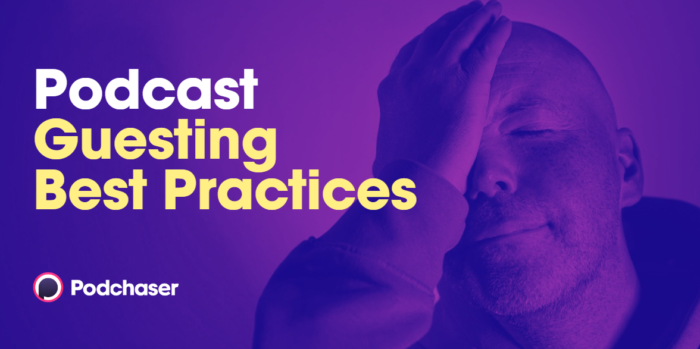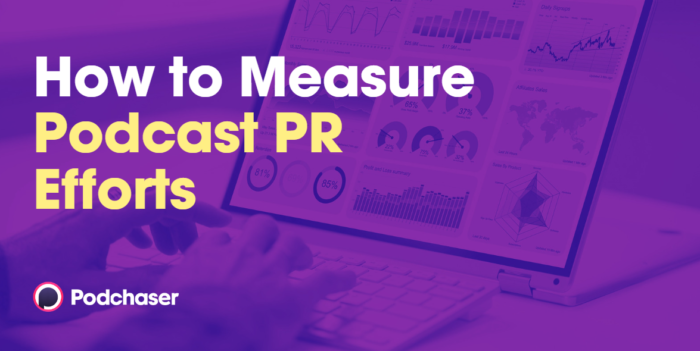Making Podcast PR Part of Your Earned Media Program
Looking for a new way to connect with your audience? Podcasting may be the perfect solution. In this post, we’ll explore podcast PR and how to use it to supercharge your earned media.
Table of Contents
- Why Make Podcasts Part of Your PR Program?
- Benefits of Making Podcasts Part of Your PR Program
- How to Make Podcasts Part of Your PR Program
- Tips for a Successful Podcast PR Strategy
- The Benefits of Podcasting
- Why You Should Add Podcasts To Your PR Strategy
- How Podcasts Can Help You Achieve Your PR Goals
- How to Measure Podcast PR
- Why are Public Relations Agencies Using Podcasting for Earned Media?
- Why is Podcasting Better than Traditional Earned Media?
- Podcast PR vs. Other Media Coverage
- Final Thoughts on Podcast PR Strategy
Why Make Podcasts Part of Your PR Program?
Podcast PR can be a great way to reach new audiences and build relationships with potential clients.
Right now, there are 383.7 million podcast listeners globally, with 100+ million active listeners in the US. Those are a lot of ears receptive to their favorite podcast shows and their guests.
Benefits of Making Podcasts a Part of Your PR Program
- Podcasts reach across a wide range of demographics because they capture both mainstream and niche interests.
- They are also relatively inexpensive to produce. Podcasts can be a cost-effective way to promote a company or product, if you decide to go the branded route.
- Podcasts are also a form of content marketing. Use podcasts to promote a company or product and build relationships with potential clients. Take key insights from podcasts and turn them into infographics, videos, social media posts, articles, and more.
- They can also help drive brand awareness, engagement on social media, and traffic to your clients’ website.
How to Make Podcasts Part of Your PR Program

Here are five tips for making podcasts part of your PR program:
1) Build relationships with influencers
Podcasting is a growing industry. There are plenty of established voices out there looking to promote their content. Partnering with these individuals can help you get preferential treatment when it comes to distribution and coverage.
2) Target key demographics
Knowing who your target market is will help you focus on the right topics and stories. Tailor your content to those who could benefit most from it, and make sure that the message resonates with them.
3) Get creative
When it comes to marketing, nothing beats creativity! Use clever audio or visual effects to promote your client’s guest appearance, and a unique angle of your podcast concept/topic. This can help set you apart from the competition, while also attracting more attention from potential listeners.
4) Book clients regularly
A consistent flow of new content will encourage audiences to keep listening. Podcasts are a long-tail strategy, so you’ll need to create a bingeable backlog; around half of podcast downloads are of old episodes. So even if your client appears on one or two podcasts a year ago, they can keep seeing ROI from those guest bookings. Something, you’ll want to emphasize to them.
Tips for a Successful Podcast PR Strategy
Step One: Find Your Niche
The first and probably the most important step in creating a successful podcast strategy is finding a niche your client feels passionate about and have expertise in. One they feel like they can talk about with ease at length.
If they can intrinsically connect with listeners, they’ll be more likely to return for future episodes or have success as a guest on other podcasts.
Once you’ve identified their ideal topic, research podcasts in that niche and learn as much as you can about their content, format, and listener base.
Podchaser Pro makes that easy.
Our all-in-one solution gives PR agencies and publicists visibility into who’s listening to podcasts and how to reach their hosts, producers, and collaborators. The Pro Insights tab provides detailed demographic information, podcast contacts, chart positions, and more for the top podcasts.
Step Two: Plan Ahead
Getting a client on a podcast takes time. So plan ahead by creating an outline of their goals, the podcast you want to target, and the equipment they may need to invest in, such as a microphone, headphones, and recording software.
Additionally, it can be helpful to have your client organize their thoughts in advance. Have them write an intro or bulleted summary of what they want to discuss to help keep them on track and make it easier for you to align their message with the podcasts you want to reach.
But don’t have your clients just read their notes on the episode. The power of podcasting is its authenticity and casual nature.
While notes can help your client remember the points they want to bring up, they should not act as a script.

Step Three: Be Compelling
In order to keep listeners interested make sure your content is interesting and informative. Don’t shy away from “being human.” A podcast guest appearance isn’t a chance to talk through your client’s resume, rather it’s an opportunity to tell their story.
If your client is representing a company or a brand, The Storybrand Messaging Framework can help them position their journey and their business’s evolution as a hero’s journey.
The Benefits of Podcasting
For businesses, podcasts have the potential to build trust with customers and generate brand awareness, engagement, and leads.
For PR professionals, podcasts offer a new way to connect with key audiences and promote brands.
Additionally, podcasts provide detailed information that can help drive conversions and sell products or services.
Why You Should Add Podcasts To Your PR Strategy
Adding podcasts to your PR strategy not only provides you with great content for your audience, but it can also help boost the visibility of your brand. Here are four ways to incorporate podcasts into your marketing plans:
#1 Run Podcast Ads
If you have the budget, running ads on podcasts can be a great way to reach new listeners. Listeners often respond well to ads because they feel like they’re getting an inside scoop on something that they may not know about otherwise.
Check out our podcast ad rates guide and see how much more cost-efficient podcast ads are than TV and Radio.
Podchaser’s Sponsor History gives you and your clients visibility into which brands are advertising on podcasts and estimates of how much they’re spending.
Related Reading: The Ultimate Guide to Podcast Media Buying
#2 Create a Landing Page
Have clients who want to guest on multiple podcasts? Capture their podcasts appearances in one place, by creating a Creator page for them.
Think of this page as their audio portfolio or resume.
Creator pages let podcast hosts and media publications see your clients’ past appearances and learn about their expertise.
And, thanks to Podchaser’s high domain rating, a Creator page can help boost your clients’ visibility.
#3 Repurpose Content
After your client appears on a Podcast turn their appearance into blogs, external articles, newsletters, social media posts, short-form audio, and video snippets.
Distribute these assets across the channel where their audience wants to be.
For example, if your client is a baker or fashion influencer, make sure they’re on Instagram, Pinterest, and TikTok.
If they’re a vegan baking expert, make sure to share snippets of their podcast appearance, photos, and existing articles. This will give their followers a 360-degree view of who they are and what’s special about them.
#4 Host a Q&A Session
Another great way to engage with your client’s audience is through Q&A sessions. This allows them to connect with listeners and answer their questions. Your clients can use Instagram Live, LinkedIn Lives, Twitter Spaces, and other platforms for riveting AMA (Ask Me Anything) or Q&A sessions.
How Podcasts Can Help You Achieve Your PR Goals
There’s no denying that podcasts are a powerful medium when it comes to reaching new ears. Data from a Statista study in early 2021 showed that 41% of the US population listened to a podcast to a podcast in the past month.
Podcasts can also be great for breaking into new markets or building relationships with key journalists and opinion-makers.
And finally, they make for great storytelling platforms, which means that your client’s brand can really shine through!
Measuring The Success Of Your Podcast PR Program

There are many ways to promote your podcasts, but the most effective way to measure the success of your PR program is to track listener engagement.
Do this with:
- Social media metrics
- Website analytics
- Surveys
- Asking the host of the podcast your client guest on the episode’s download stats
Keeping an eye on listener engagement can help you adjust your content to increase visibility.
Social media metrics
One of the best ways to measure listener engagement is through social media metrics.
Social media platforms like Facebook and Twitter allow you to track how many people have engaged with your content on a given day or week. This information can help you determine which episodes and posts are resonating with your clients’ audience and help them tailor future content.
Website analytics
Website analytics can also be helpful in measuring listener engagement. This information can tell you how many people visited your website after listening to an episode, what city or state the listeners were from, and how long they spent on your client’s site.
Include a promo code and create a form with a field that asks visitors how they heard about your client. With this data, you can determine which episodes are most popular and identify areas for optimization.
Surveys
You can use surveys to gather feedback about your client’s podcast appearance and use it in future appearances.
Asking the Podcast Host
For accurate numbers, you can ask the podcast host to share your client’s guest episode’s download numbers with you. But to avoid a misstep, read our podcast guest etiquette guide first.
How to Measure Podcast PR
To measure the success of your podcast PR program, you need to track the following:
- How many people listen to your podcasts
- What topics are people talking about on your podcasts
- How many new followers you gain from podcasting
- How much traffic you generate from podcasting content
By tracking these metrics, you can determine whether your podcast PR program is working and make adjustments as needed.
Why Are Public Relations Agencies Using Podcasting for Earned Media?
Public relations agencies are using podcasting for earned media because it offers a new and unique way to share information with the public.
Podcasts allow PR professionals to communicate with their target audience in an informal and intimate way, as well as make connections with potential clients.
Podcasts can also distribute brand messages, educate customers about products or services, and promote company culture.
Why is Podcasting Better than Traditional Earned Media?

Use Podcasts to Connect with Your Target Audience
When it comes to connecting with your target audience, podcasts are a great way to do so. They’re fresh and new, which can make them more interesting and engaging for listeners.
- First, podcasting is free vs. other forms of earned media like billboards or TV spots.
- Second, people tend to listen to podcasts on their own time, which is the best environment for selling products or services.
Using podcasts as part of your PR program can be a worthwhile way for your clients to connect with their target audience and build relationships with them.
Use Podcasts to Enhance Your Thought Leadership Authority
Podcasting is not only phenomenal for entertainment purposes, but it is also an effective marketing tool. Because they are audio-only, podcasts can be more engaging than traditional earned media channels such as website content or blog posts.
They also lack the same barriers to entry that other forms of earned media have (e.g., expensive equipment). As a result, podcasting has become an effective way to promote brands and engage with potential customers.
Use Podcast PR Drive Traffic to Your Website
Podcasting is an effective way to get your message out to a large audience quickly and easily. It’s also help drive traffic to your clients’ website and digital properties.
3 Ideas for Podcast PR
- You can book clients on podcasts that promote their company or product in the same way that you would if you were using traditional earned media like TV ads or magazine articles.
- Next, you can book clients on episodes that focus on specific customer segments or target audiences.
- Finally, you can buy media — pay to promote a client or brand through sponsorship or podcast ads.
Podcasting is changing the landscape of public relations, and there’s no reason why you shouldn’t be part of the trend.
Podcast PR vs. Other Media Coverage
One of the best things about podcasts is that they continue to be popular even after their release. This means that you can promote a podcast appearance for quite some time before it reaches its peak listenership.
Since podcasting is such an individualized medium, it’s also great for generating leads and building relationships with potential customers.
Showcasing your clients’ company or product on a popular podcast can help you connect with people who may not have heard of them yet.
Plus, if someone enjoys what they heard and decides to learn more about what your client offers, they may visit their website or contact them directly as a result!
Final Thoughts on Podcast PR Strategy
Podcasts can be a valuable part of your PR program. By following the tips above, you can create successful guest booking strategies or start a branded podcast.
For unbeatable podcast intel, demographics, and contact information, check out Podchaser Pro.
Related Articles
Unlock more with Podchaser Pro
- Audience Insights
- Contact Information
- Demographics
- Charts
- Sponsor History
- and More!

- Account
- Register
- Log In
- Find Friends
- Resources
- Help Center
- Blog
- API
Podchaser is the ultimate destination for podcast data, search, and discovery. Learn More
- © 2024 Podchaser, Inc.
- Privacy Policy
- Terms of Service
- Contact Us